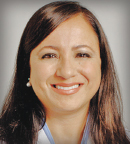A new report from an ASCO expert panel that addresses unanswered questions about biosimilars—licensed biologic products that are largely analogous to products approved by the U.S. Food and Drug Administration (FDA)—found that they may represent an affordable and effective alternative for cancer care.1 The report supports the inclusion of biosimilars in clinical practice guidelines, which could help expand their use with patients.

Shilpi Gupta, MD
“Oncology-related biosimilars were first approved by the FDA in 2015, and we currently have 17 agents approved for use. But there exist practice gaps in the incorporation of biosimilars into oncology practice,” said Expert Panel Co-Chair Shilpi Gupta, MD, of Morristown Medical Center. “With this report, we wanted to address what biosimilars are, their approval process, and incorporation into oncology treatments. We felt this work was particularly important given that biosimilars might offer a lower-cost alternative to biologics and may be an acceptable alternative, when appropriate.”
Unravelling the Mystery
As more biosimilars have entered the U.S. oncology market as therapeutic alternatives to corresponding reference products, it has become clear that unanswered questions abound regarding what biosimilars are, their distinction from generic drugs, the oncology field’s lack of familiarity with the FDA’s biosimilar product approval process, and the optimal and safe use of biosimilars in clinical practice. To help close these knowledge gaps, an ASCO expert panel reviewed published literature and drug package inserts to develop a practical summary on currently approved biosimilar therapeutics for cancer treatment or supportive care in the United States to support their inclusion in guidelines.
“Among the key purposes of the report was to clarify what biosimilars are,” said Zeina Nahleh, MD, of Cleveland Clinic Florida, and Expert Panel Co-Chair, adding that the FDA defines a biosimilar product as highly similar to but not identical to an already licensed biologic product—also termed a reference product or bio-originator—in terms of quality, safety, and efficacy. “Furthermore, we found that biosimilars might provide competitive, lower-cost alternatives to biologics used in cancer care, which warrants inclusion in ASCO guidelines, where appropriate.”

Zeina Nahleh, MD
However, Dr. Nahleh noted that although biosimilars have the potential to decrease the overall cost of care and improve access to cancer therapies, more data are needed to assess their true value.
Lack of clinician understanding about biosimilars and their utility may be critical contributors to their underuse.2 As such, the report clarifies fundamental differences between biosimilars and their frequently confused counterparts: generic drugs. Other major barriers to biosimilar use identified by the panel include fear that their safety and efficacy may not be comparable to those of reference products and that FDA approval of biosimilars is based on inadequate evidence. These misbeliefs underscore the need for ongoing prescriber education, Drs. Nahleh and Gupta said.
The report identifies several safe and effective biosimilars for commonly used oncology therapies, such as bevacizumab, rituximab, and trastuzumab (among others), eligible for inclusion in guidelines. But the panel also concluded that none of the available oncology biosimilars have been recognized as interchangeable with their respective bio-originators.
A biosimilar is considered interchangeable when a pharmacist can substitute it for the reference product without the intervention of the prescribing physician. Although the potential for safety concerns from switching from a licensed biologic to a biosimilar have been raised, these issues were addressed in the 2018 FDA guidelines on biosimilar interchangeability.3 However, Dr. Gupta advised health-care institutions still to review individual biosimilars with their pharmacy and therapeutic committees prior to incorporating them into their formulary list.
Similar vigilance is needed when it comes to prescribing biosimilars as a cost-saving strategy, in order “to minimize financial burden on patients,” Dr. Nahleh added.
“Clinicians are encouraged to check with their pharmacy and therapeutics committees, so they can deliver the cancer treatment that is most appropriate for their patient population and payer mix,” Dr. Nahleh said. “Both the provider’s payment and patient’s share can vary substantially depending on the biological product prescribed.”
Unresolved Challenges Signal Need for More Data
The Panel noted several unresolved concerns about the use of biosimilars in oncology that signal the need for more data collection. For instance, continued tracking and monitoring of each individual biosimilar could help better identify potential efficacy and safety concerns, such as adverse immunologic reactions. More postapproval transparency in the cost of biosimilars could be critical in determining whether they can truly reduce financial hardships for patients. Relatedly, the administration of and reimbursement for biosimilars present complex challenges in health care that will require further scrutiny. And additional research on patient-related factors—such as adherence, acceptance, and access—is also warranted.
Nonetheless, the panel recognized their potential significance in clinical care and concluded that FDA-approved biosimilars should be integrated into clinical practice guidelines—a move that could be key to influencing practice behaviors and convincing prescribers to adopt these products with both confidence and regularity.
“With this report, we hope to have addressed many of the concerns clinicians have pertaining to biosimilar use,” Dr. Gupta said. “And in doing so, we ultimately hope to help our patients.”
REFERENCES
1. Nahleh Z, Lyman GH, Schilsky RL, et al: Use of biosimilar medications in oncology. JCO Oncol Pract. January 18, 2022 (early release online).
2. Konstantinidou S, Papaspiliou A, Kokkotou E: Current and future roles of biosimilars in oncology practice. Oncol Lett 19:45-51, 2020.
3. U.S. Food and Drug Administration: Biosimilars action plan: Balancing innovation and competition. Available at https://www.fda.gov/media/114574/download. Accessed February 15, 2022.
© 2022. American Society of Clinical Oncology. All rights reserved.

